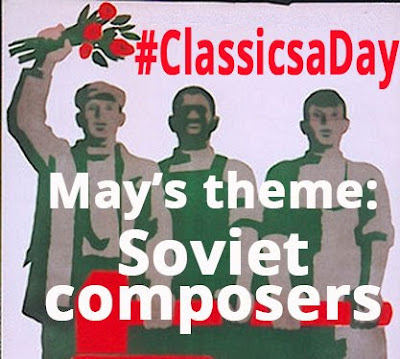Introduction
One of the ongoing Twitter hashtag groups I participate with is #ClassicsaDay. The idea’s pretty simple: post a link to a classical work, and – in the body of the tweet – provide a little info about it.For May 2017, some of the participants decided to include a theme. There were two obvious choices: Mexican composers in honor of Cinco de Mayo, or Soviet composers in honor of May Day. We chose the latter. Hense, #SovietaDay
This is an annotated list of the composers I presented as part of that hashtag. I deliberately avoided the obvious choices, such as Sergei Prokofiev and Dmitri Shostakovich. The Soviet Union was home to many other talented composers. And some of them have compelling stories.
The Soviet Ideal
Classical music in the Soviet era is a fascinating area of study. Lenin said, "Every artist, everyone who considers himself an artist, has the right to create freely according to his ideal, independently of everything. However, we are Communists and we must not stand with folded hands and let chaos develop as it pleases. We must systemically guide this process and form its result." |
| An image of the Lenin Prize, the USSR's most prestigious cultural award. |
"[who cares] what art gives to hundreds, or even thousands, out of a total population numbering millions. Art belongs to the people."
Stalin would solidify the idea that Soviet music must be something the common worker could understand and take pride in. And how exactly to achieve that? For the party leaders, it was pretty much "they knew it when they heard it." And they also knew dissent when they heard it, too -- even if it wasn't the composer's intent.
There's no Soviet bloc
You might think that a heavy-handed state-administered arts program would result in a repertoire of bland and self-serving patriotic piffle. But that's hardly the case. Soviet Era music varies widely in style and quality (although a little conservative with from and forces).The era had composers who were wildly creative. Some channeled that creativity along approved guidelines, resulting in works of far better quality than they needed to be. Often there's a hint of subversiveness in this music, that gives them life today.
 |
| The Stalin Prize. You could win it one year, and be under arrest the next. |
Some who were solid members of the Party and were models of creating the Soviet ideal of "art for the masses." It's the music of this group that's fallen into neglect, mostly because it served a function, but offers little of substance. It's also under-represented on my list.
This month's theme yielded a collection of repertoire standards, works deserving rediscovery, and music that is, sadly, of its time. In other words, the same mix of the classical music from just about every other country.
Next week: Soviet composers born between 1859-1913

No comments:
Post a Comment